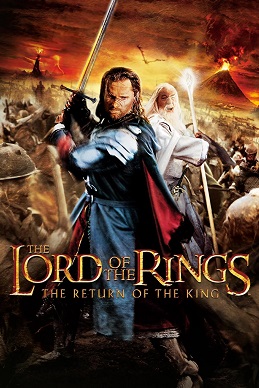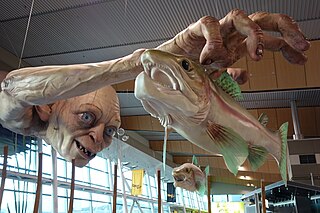See also
- Captain Frodo (born 1976), Norwegian contortionist
Frodo Baggins is a fictional character in The Lord of the Rings by J.R.R. Tolkien.
Frodo may also refer to:

Bilbo Baggins is the title character and protagonist of J. R. R. Tolkien's 1937 novel The Hobbit, a supporting character in The Lord of the Rings, and the fictional narrator of many of Tolkien's Middle-earth writings. The Hobbit is selected by the wizard Gandalf to help Thorin and his party of Dwarves reclaim their ancestral home and treasure, which has been seized by the dragon Smaug. Bilbo sets out in The Hobbit timid and comfort-loving and, through his adventures, grows to become a useful and resourceful member of the quest.
Samwise Gamgee is a fictional character in J. R. R. Tolkien's Middle-earth. A hobbit, Samwise is the chief supporting character of The Lord of the Rings, serving as the loyal companion of the protagonist Frodo Baggins. Sam is a member of the Company of the Ring, the group of nine charged with destroying the One Ring to prevent the Dark Lord Sauron from taking over the world.
Glorfindel is a fictional character in J. R. R. Tolkien's Middle-earth legendarium. He is a member of the Noldor, one of the three groups of High Elves. The character and his name, which means "blond" or "golden-haired", were among the first created for what would become part of his Middle-earth legendarium in 1916–17, beginning with the initial draft of The Fall of Gondolin. His name indicates his hair as a mark of his distinction, as the Noldor were generally dark-haired. A character of the same name appears in the first book of The Lord of the Rings, The Fellowship of the Ring, which takes place in Middle-earth's Third Age. Within the story, he is depicted as a powerful Elf-lord who could withstand the Nazgûl, wraith-like servants of Sauron, and holds his own against some of them single-handedly. Glorfindel and a version of the story of the Fall of Gondolin appear in The Silmarillion, posthumously published in 1977.

The Lord of the Rings: The Fellowship of the Ring is a 2001 epic high fantasy adventure film directed by Peter Jackson from a screenplay by Fran Walsh, Philippa Boyens, and Jackson, based on 1954's The Fellowship of the Ring, the first volume of the novel The Lord of the Rings by J. R. R. Tolkien. The film is the first instalment in The Lord of the Rings trilogy. It features an ensemble cast including Elijah Wood, Ian McKellen, Liv Tyler, Viggo Mortensen, Sean Astin, Cate Blanchett, John Rhys-Davies, Billy Boyd, Dominic Monaghan, Orlando Bloom, Christopher Lee, Hugo Weaving, Sean Bean, Ian Holm, and Andy Serkis.
Among the motion pictures of Middle-earth in various formats, The Lord of the Rings is a trilogy of epic fantasy adventure films directed by Peter Jackson, based on the novel The Lord of the Rings by English author J. R. R. Tolkien. The films are titled identically to the three volumes of the novel: The Fellowship of the Ring (2001), The Two Towers (2002), and The Return of the King (2003). Produced and distributed by New Line Cinema with the co-production of WingNut Films, the films feature an ensemble cast including Elijah Wood, Ian McKellen, Liv Tyler, Viggo Mortensen, Sean Astin, Cate Blanchett, John Rhys-Davies, Christopher Lee, Billy Boyd, Dominic Monaghan, Orlando Bloom, Hugo Weaving, Andy Serkis, and Sean Bean.

The Return of the King is a 1980 American-Japanese animated musical fantasy television film created by Rankin/Bass and Topcraft. It is an adaptation of part of J. R. R. Tolkien's 1955 high fantasy novel The Lord of the Rings. It takes its name from The Return of the King, the third and final volume of the novel, and is a sequel to the 1977 film The Hobbit.
In J. R. R. Tolkien's epic fantasy novel The Lord of the Rings, the Battle of the Morannon or the Battle of the Black Gate is the final confrontation in the War of the Ring. Gondor and its allies send a small army ostensibly to challenge Sauron at the entrance to his land of Mordor; he supposes that they have with them the One Ring and mean to use it to defeat him. In fact, the Ring is being carried by the hobbits Frodo Baggins and Sam Gamgee into Mordor to destroy it in Mount Doom, and the army is moving to distract Sauron from them. Before the battle, a nameless leader, the "Mouth of Sauron", taunts the leaders of the army with the personal effects of Frodo and Sam. Battle is joined, but just as it seems the army of Gondor will be overwhelmed, the Ring is destroyed, and the forces of Sauron lose heart. Mount Doom erupts, and Sauron's tower, Barad-dûr, collapses, along with the Black Gate. The army of Gondor returns home victorious, the War of the Ring won.

The Lord of the Rings: The Fellowship of the Ring is a 2002 action-adventure video game developed by WXP for the Xbox. Two additional versions were developed by Pocket Studios for Game Boy Advance and by Surreal Software for PlayStation 2 and Windows. The game was published by Vivendi Universal Games under their Black Label Games publishing label. In North America, it was released for Xbox and Game Boy Advance in September, and for PlayStation 2 and Windows in October. In Europe, it was released for Xbox, Windows and Game Boy Advance in November, and for PlayStation 2 in December.

The Lord of the Rings: The Two Towers is a 2002 action hack and slash video game developed by Stormfront Studios for the PlayStation 2 and Xbox. A 2D Game Boy Advance game of the same name was made by Griptonite Games, a port to the GameCube by Hypnos Entertainment, and to mobile by JAMDAT. A version for Microsoft Windows developed by Ritual Entertainment was cancelled during development. The game was published on all platforms by Electronic Arts. It is an adaption of the 2002 film of the same name. Originally released in North America for the PlayStation 2 in October 2002, it was released in November 2002 for the Game Boy Advance, in December 2002 for the Xbox and GameCube, and in May 2003 for mobile.

The Lord of the Rings: The Return of the King is a 2003 hack and slash action game developed by EA Redwood Shores for the PlayStation 2 and Windows. It was ported to the GameCube and Xbox by Hypnos Entertainment, to the Game Boy Advance by Griptonite Games, to mobile by ImaginEngine, and to Mac OS X by Beenox. The game was published by Electronic Arts. It is the sequel to the 2002 game The Lord of the Rings: The Two Towers.

"The Road Goes Ever On" is a title that encompasses several walking songs that J. R. R. Tolkien wrote for his Middle-earth legendarium. Within the stories, the original song was composed by Bilbo Baggins and recorded in The Hobbit. Different versions of it also appear in The Lord of the Rings, along with some similar walking songs.
The Lord of the Rings: Journey to Rivendell was a video game scheduled to be released in the winter of 1983. Parker Brothers was set to publish it, and advertised it in their 1982 and 1983 catalogues as a game that would be released on the Atari 2600 and Atari 8-bit computers. The game was originally advertised under the name Lord of the Rings, and in one case as The Lord of the Rings I. It was described as an adventure of getting Frodo from the Shire to the door at Moria, a description which was later changed in the 1983 Parker Brothers Video Games catalogue to have Rivendell as the adventures end point instead. The same catalogue was first time the game was ever referred to as The Lord of the Rings: Journey to Rivendell, and was the last advertisement the game ever received. The game was never released, and it was believed that little or no work was done on the game's coding.

Gollum is a monster with a distinctive style of speech in J. R. R. Tolkien's fantasy world of Middle-earth. He was introduced in the 1937 fantasy novel The Hobbit, and became important in its sequel, The Lord of the Rings. Gollum was a Stoor Hobbit of the River-folk who lived near the Gladden Fields. In The Lord of the Rings, it is stated that he was originally known as Sméagol, corrupted by the One Ring, and later named Gollum after his habit of making "a horrible swallowing noise in his throat".

The Lord of the Rings: Aragorn's Quest is an action-adventure video game released in 2010 by WB Games on various Nintendo and Sony platforms, with Headstrong Games developing a Wii version and TT Fusion developing the game on other platforms.
Frodo Baggins is a fictional character in J. R. R. Tolkien's writings and one of the protagonists in The Lord of the Rings. Frodo is a hobbit of the Shire who inherits the One Ring from his cousin Bilbo Baggins, described familiarly as "uncle", and undertakes the quest to destroy it in the fires of Mount Doom in Mordor. He is mentioned in Tolkien's posthumously published works, The Silmarillion and Unfinished Tales.

Hobitit is a nine-part Finnish live action fantasy television miniseries directed by Timo Torikka, originally broadcast in 1993 on Yle TV1.
Character pairing in The Lord of the Rings is a literary device used by J. R. R. Tolkien, a Roman Catholic, to express some of the moral complexity of his major characters in his heroic romance, The Lord of the Rings. Commentators have noted that the format of a fantasy does not lend itself to subtlety of characterisation, but that pairing allows inner tensions to be expressed as linked opposites, including, in a psychoanalytic interpretation, those of Jungian archetypes.
Commentators have compared Peter Jackson's 2001–2003 The Lord of the Rings film trilogy with the book on which it was based, J. R. R. Tolkien's 1954–1955 The Lord of the Rings, remarking that while both have been extremely successful commercially, the film version does not necessarily capture the intended meaning of the book. They have admired Jackson's ability to film the long and complex work at all; the beauty of the cinematography, sets, and costumes; the quality of the music; and the epic scale of his version of Tolkien's story. They have, however, found the characters and the story greatly weakened by Jackson's emphasis on action and violence at the expense of psychological depth; the loss of Tolkien's emphasis on free will and individual responsibility; the flattening out of Tolkien's balanced treatment of evil to a simple equation of the One Ring with evil; and the replacement of Frodo's inner journey by an American "hero's journey" or monomyth with Aragorn as the hero.

Khraniteli is a Soviet television play miniseries based on J. R. R. Tolkien's The Fellowship of the Ring. It was broadcast once in 1991 by Leningrad Television and then thought lost before being rediscovered in 2021. It includes scenes of Tom Bombadil and Goldberry that were omitted from the 1978 film and Peter Jackson's Lord of the Rings film trilogy.
J. R. R. Tolkien used frame stories throughout his Middle-earth writings, especially his legendarium, to make the works resemble a genuine mythology written and edited by many hands over a long period of time. He described in detail how his fictional characters wrote their books and transmitted them to others, and showed how later in-universe editors annotated the material.